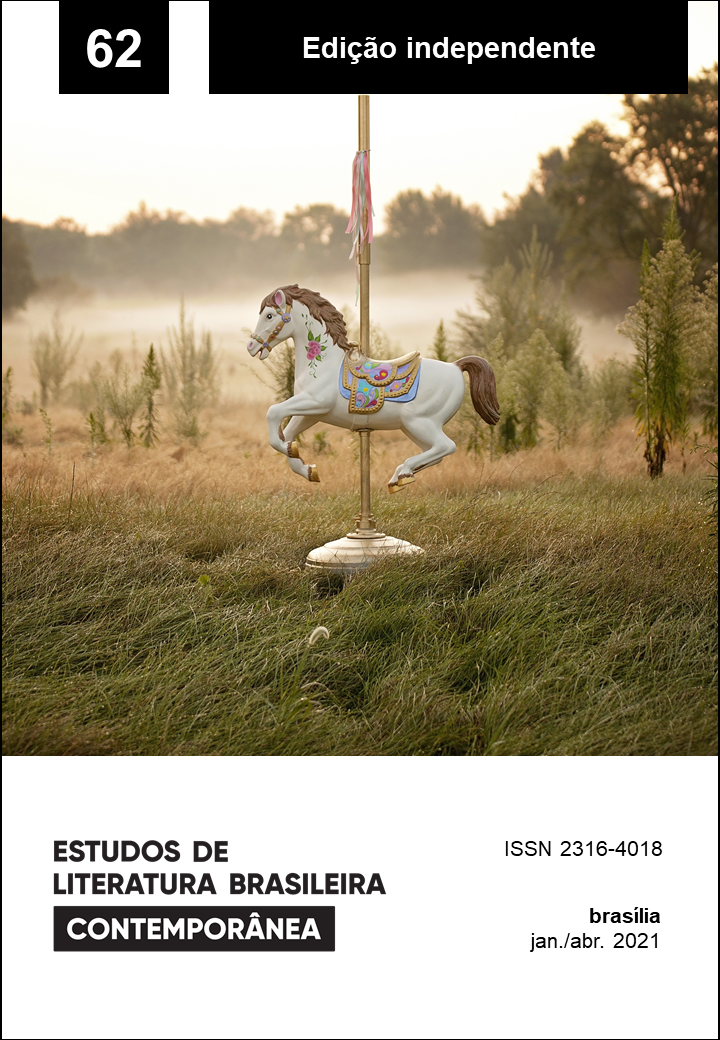The Liquidity of Modernity in the Narrative of Sérgio Sant’Anna: Representations of Desire and Violence
DOI:
https://doi.org/10.1590/2316-40186215Keywords:
liquid modernity, desire and violence, “O embrulho da carne”, Sérgio Sant’AnnaAbstract
The present work embarks on an ambivalent flight that transports representations of liquid modernity, a metaphor of fluidity of contemporary “existence,” developed by the sociologist Zygmunt Bauman (1925). In such a liquid scenario, human relationships are at the center of attention in the production of contemporary Brazilian art. The purpose of this paper is to highlight themes raised in the complexities of narratives of liquid modernity, such as desire, fear and violence. To this end, we present an interpretation based on the aesthetic-receptional vision of Hans Robert Jauß in the short story “O embrulho da carne”, from the work O voo da madrugada (2003), by the Brazilian writer Sérgio Sant’Anna.
Downloads
References
ADORNO W. Theodor (1988). Teoria estética. Tradução de Artur Morão. São Paulo: Martins Fontes.
BAUMAN, Zygmunt (2001). Modernidade líquida. Tradução de Plínio Dentizien. Rio de Janeiro: Jorge Zahar.
BAUMAN, Zygmunt (2004). Amor líquido. Tradução de Carlos Alberto Medeiros. Rio de Janeiro: Jorge Zahar.
BAUMAN, Zygmunt (2005). Identidade. Tradução de Carlos Alberto Medeiros. Rio de Janeiro: Jorge Zahar.
CURY, Maria Zilda Ferreira (2007). Novas geografias narrativa. Letras de Hoje, Porto Alegre, v. 42, n. 4, p. 7-17, dez.
DALCASTAGNÈ, Regina (2005). Violência, marginalidade e espaço na narrativa brasileira contemporânea. Diálogos latino-americanos, Aarhus, v. 11, p. 72-82.
FERREIRA, Aurélio Buarque de Holanda (2008). Miniaurélio: o minidicionário da língua portuguesa. 7. ed. Curitiba: Positivo.
GONGORA, Anderson Possani (2006). Ficção e violência: as narrativas de Sérgio Sant’Anna e leituras sufocantes. In: CONGRESSO INTERNACIONAL ABRALIC, 10.,. Anais [...] Rio de Janeiro: Abralic. p. 1-8.
JAUSS, Hans Robert (1969/1994). A história da literatura como provocação à teoria literária. Tradução de Sérgio Tellaroli. São Paulo: Ática.
MIRANDA, Mariana Lage, (2007), Objeto ambíguo: arte e estética na experiência contemporânea, segundo H. R. Jauss. Dissertação (Mestrado em Filosofia) – Universidade Federal de Minas Gerais, Belo Horizonte.
PALLARES-BURKE, Maria Lúcia Garcia (2004). Entrevista com Zigmunt Bauman. Tempo social, São Paulo, v. 16, n. 1, p. 301-325.
PELLEGRINI, Tânia (2004). No fio da navalha: literatura e violência no Brasil de hoje. Estudos de Literatura Brasileira Contemporânea, Brasília, n. 24, p. 15-34, jul./dez.
SANT’ANNA, Sérgio (2003). O voo da madrugada. São Paulo: Companhia das Letras.
SANT’ANNA, Sérgio (2012). Sérgio Sant’Anna, o autor imprevisível. [Entrevista concedida a] Guilherme Pavarin. Revista Época, 19 out. Disponível em: http://revistaepoca.globo.com/cultura/noticia/2012/10/sergio-santanna-o-autor-imprevisivel.html. Acesso em: 1º jan. 2019.
SCHØLLHAMER, Karl Erik (2009). O realismo de novo. In: SCHØLLHAMER, Karl Erik Ficção brasileira contemporânea. Rio de Janeiro: Civilização Brasileira. p. 53-104.
Downloads
Published
How to Cite
Issue
Section
License
Copyright (c) 2021 Márcia Denise da Rocha Collinge, Elielson Figueiredo

This work is licensed under a Creative Commons Attribution-NoDerivatives 4.0 International License.
Authors who publish in this journal agree to the following terms:
a) The authors maintain the copyright and grant the journal the right of first publication, the work being simultaneously licensed under the Creative Commons Attribution License-Non Commercial 4.0 which allows the sharing of the work with acknowledgment of the authorship of the work and publication this journal.
b) Authors are authorized to enter into additional contracts separately, for non-exclusive distribution of the version of the work published in this journal (eg publish in institutional repository or as a book chapter), with authorship recognition and publication in this journal.
c) Authors are allowed and encouraged to publish and distribute their work online (eg in institutional repositories or on their personal page) after the editorial process, as this can generate productive changes, as well as increase the impact and citation of published work (See The Effect of Free Access).
d) The authors of the approved works authorize the magazine to, after publication, transfer its content for reproduction in content crawlers, virtual libraries and the like.
e) The authors assume that the texts submitted to the publication are of their original creation, being fully responsible for their content in the event of possible opposition by third parties.


